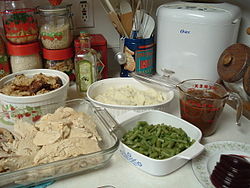- Leftovers
-
This article is about food. For the band, see The Leftovers.
 Leftovers from an American holiday meal: mashed potatoes, gravy, cranberry sauce, green beans, turkey
Leftovers from an American holiday meal: mashed potatoes, gravy, cranberry sauce, green beans, turkey
Leftovers are the uneaten edible remains of a meal after the meal is over, and everyone has finished eating. Food scraps that are not considered edible (such as bones or the skins of some vegetables and fruits) are not regarded as leftovers, but rather as waste material; any remaining edible portions constitute the leftovers.
The ultimate fate of leftovers depends on where the meal was eaten, the preferences of the diner, and the prevailing social culture. Home cooking leftovers are often saved to be eaten later. This is facilitated by being in a private environment, with food preserving facilities such as airtight containers and refrigeration close at hand. Some leftover food can be eaten cold from the refrigerator, while others may be reheated in a microwave or a conventional oven, or mixed with additional ingredients and recooked to make a new dish such as bubble and squeak.
New dishes made from leftovers are quite common in world cuisine, and many were created in the days before refrigeration and reliable airtight containers existed. Besides capturing nutrition from otherwise inedible bones, stocks and broths make an excellent base for adding leftover morsels too small to be a meal themselves. Casseroles,[1] paella, fried rice,[2] and pizza can also be used for this purpose, and may even have been invented as a means of reusing leftovers. Among American university students, leftover pizza itself has acquired particular in-group significance, to the extent that the USDA's Food Safety and Inspection Service offers, as its first tip under "Food Safety Tips for College Students",[3] a discussion of the risks of eating unrefrigerated pizza, which are considerable.[4]
Leftovers from a restaurant meal may either be left behind to be discarded by the restaurant, or taken away by the diner for later consumption. In order to take the food away, the diner may make a request for it to be packaged. The container used for such leftovers is commonly called a doggy bag or doggie bag. It is speculated that this derives from the euphemistic pretense that the food will be given to the diner's pet, rather than eaten by a person.[5] However it may also be a corruption of the East Anglian term docky, meaning lunch. The term doggy bag is preferred[citation needed] over take away or take home bag as it was popularized in the 1970s etiquette columns of many newspapers.[6] Doggy bags are most common in restaurants that offer a take-out food service as well as sit-down meals, and their prevalence as an accepted social custom varies widely by location. In some countries, like France, people would frown upon a diner asking for a doggy bag.
At some holiday meals, such as Christmas in Western countries and Thanksgiving in the USA, it is customary for the host to prepare much more food than can be eaten, specifically in order to send leftovers home with the guests. Cold turkey is archetypal in the United States as a Thanksgiving leftover, with turkey meat often reappearing in sandwiches, soups, and casseroles for several days after the feast.
Though leftover or partially-eaten food (Ucchishta) is never offered to a Hindu deity, the goddess Matangi is prescribed to be offered this taboo oblation to gain her grace to achieve Supreme knowledge and supernatural powers.
The word "ort", meaning a small scrap of food left after a meal is completed, is not commonly heard in conversation, but is frequently encountered in crossword puzzles.
See also
References
- ^ Smith, Andrew F., ed (2004). Oxford Encyclopedia of Food and Drink in America. 1. New York: Oxford University Press. pp. 194. "With the addition or subtractions of leftovers or inexpensive cuts of meat, the casserole is flexible and economical in terms of both ingredients and effort." (As quoted in Olver, Lynne (2007-06-03). "Food Timeline history notes: ambrosia to corn bread". The Food Timeline. http://www.foodtimeline.org/foodfaq.html. Retrieved 2007-06-05.)
- ^ Olver, Lynne (2006-08-06). "Food Timeline--history notes: Asian-American cuisine". http://www.foodtimeline.org/foodasian.html#friedrice. Retrieved 2007-06-05. "Fried rice and noodle dishes with vegetables are likewise ancient. They were typically composed of leftover ingriedents and cooked in woks."
- ^ "Food Safety 101: USDA Offers Food Safety Tips For College Students". 2005-08-24. http://www.fsis.usda.gov/News_&_Events/NR_082405_01/index.asp. Retrieved 2010-05-12. "Leftover pizza ... and other take-out foods should be refrigerated as soon as possible. Perishable food should never be out of refrigeration more than two hours."
- ^ "Cold pizza: friend or foe? Food safety in your residence hall". Georgetown University Health Education Services. 2003. http://be.georgetown.edu/46655.html. Retrieved 2010-05-12. "If a food has been out of the refrigerator for more than two hours, then it is considered unsafe and should be thrown out."
- ^ "doggy bag". The American Heritage Dictionary of the English Language: Fourth Edition.. 2000. http://www.bartleby.com/61/28/D0322800.html. Retrieved 2007-06-05.
- ^ "The partial triumph of the doggy bag". http://victualling.wordpress.com/2010/06/20/the-partial-triumph-of-the-doggie-bag/. Retrieved 2010-09-21..
External links
Categories:
Wikimedia Foundation. 2010.
